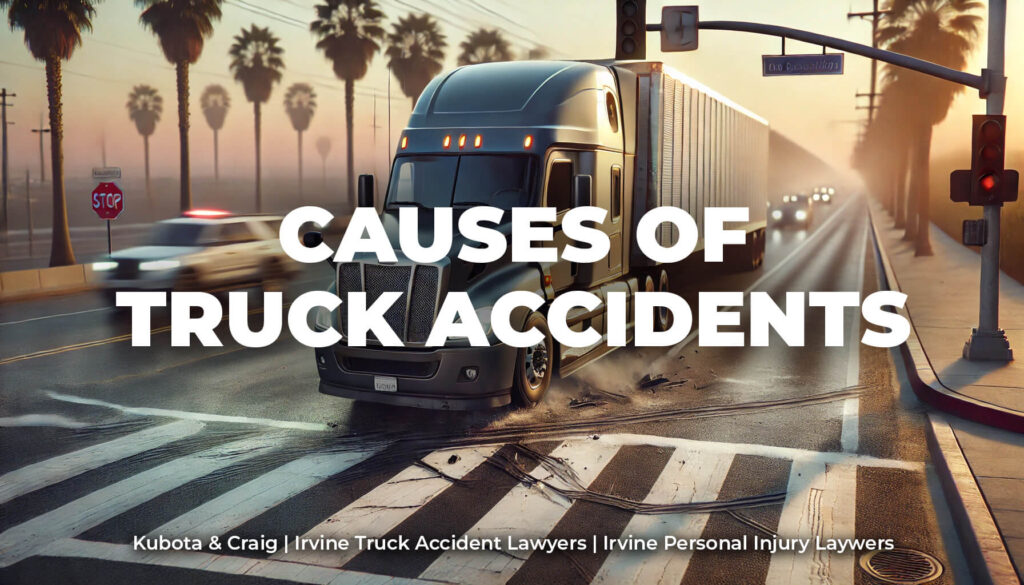Causes of Truck Accidents: How Negligence Changes Lives in an Instant
Truck accidents are some of the most devastating incidents on the road. Due to the massive size and weight of commercial trucks, collisions involving these vehicles often result in catastrophic injuries or fatalities, especially for motorists in smaller vehicles. Understanding the most common causes of truck accidents—and how negligence plays a role—can help victims seek the compensation and justice they deserve.

Why Truck Accidents Are So Dangerous
Commercial trucks, including semis, 18-wheelers, and tractor-trailers, can weigh up to 80,000 pounds. The sheer force of a collision with such a large vehicle can lead to devastating outcomes. For motorists in smaller cars, SUVs, or motorcycles, the risk of severe injury or death is exponentially higher in a crash with a truck.
Truck accidents are often preventable, but when negligence comes into play, the consequences can be life-altering. Whether it’s an overworked driver, a poorly maintained vehicle, or unsafe cargo, knowing the root causes can help victims build a case for compensation.
Driver Fatigue and Overworked Drivers
Driver fatigue is one of the most common causes of truck accidents. Truck drivers are often under intense pressure to meet tight deadlines, which can lead them to work long hours without adequate rest. Although there are strict federal regulations governing how many hours a driver can be on the road, these rules are not always followed or enforced.
The Federal Motor Carrier Safety Administration (FMCSA) mandates that truck drivers must take mandatory rest breaks. However, drivers and companies sometimes ignore these rules to meet delivery schedules. When a driver is fatigued, their reaction times slow, their judgment is impaired, and they may even fall asleep at the wheel, leading to deadly crashes.
Improperly Loaded or Overloaded Cargo
Commercial trucks are designed to carry heavy cargo, but overloaded or improperly secured loads can turn these vehicles into dangerous hazards. When cargo is not loaded correctly, it can shift during transit, making the truck difficult to control or causing it to tip over.
Overloading can also cause mechanical strain on the truck’s brakes and tires, increasing the risk of a mechanical failure. In some cases, the extra weight can cause the truck to need more time to stop, leading to rear-end collisions. Trucking companies and drivers are responsible for ensuring their cargo is within legal weight limits and properly secured.
Mechanical Failures Due to Negligent Maintenance
Trucking companies are required to perform regular maintenance on their vehicles, but unfortunately, negligent maintenance is a common factor in truck accidents. When trucks are not properly maintained, critical systems such as brakes, tires, and engines can fail unexpectedly.
For example, brake failure is one of the leading causes of truck accidents, often resulting from worn brake pads, improper adjustments, or faulty air brakes. Similarly, tire blowouts can cause a driver to lose control, leading to a catastrophic crash. When a truck accident is caused by poor maintenance, the trucking company can be held liable for failing to keep their vehicles in safe condition.
Aggressive or Distracted Driving
Like all drivers, truck operators are susceptible to aggressive or distracted driving behaviors that can lead to accidents. Given the size and weight of a truck, aggressive driving—such as speeding, tailgating, or erratic lane changes—creates even more danger on the road.
Distracted driving, such as texting or using a cell phone while behind the wheel, is another leading cause of truck accidents. A moment of inattention can be deadly, as trucks take much longer to stop than regular vehicles. When truck drivers engage in these behaviors, they put everyone on the road at risk.
How to Prove Negligence in a Truck Accident Case
Proving negligence in a truck accident case requires demonstrating that the truck driver, trucking company, or another responsible party failed to act with reasonable care, leading to the accident. Here’s how you can prove negligence:
- Driver Logs and Records: To prove driver fatigue, your attorney can request the truck driver’s logs and hours of service records. If these logs show that the driver violated FMCSA regulations, this can serve as strong evidence of negligence.
- Maintenance Records: If a mechanical failure caused the accident, obtaining the trucking company’s maintenance records is critical. These records can reveal whether the truck was properly serviced or if there were any known mechanical issues that were ignored.
- Cargo Documentation: To prove that an overloaded or improperly secured load caused the crash, cargo logs and weight documentation can be used to show violations of loading regulations.
- Black Box Data: Many commercial trucks are equipped with event data recorders, commonly known as black boxes, which record crucial information about the truck’s speed, braking, and other actions leading up to the accident. This data can help establish whether the driver was speeding or failed to take evasive action in time.
By gathering this evidence, victims of truck accidents can build a strong case to prove that negligence played a role in the crash, increasing the likelihood of receiving fair compensation for their injuries.
Conclusion:
At Kubota & Craig, we’re here to guide you through the legal complexities so you can focus on what matters most—your recovery. Contact us today for a free consultation, and let us handle the heavy lifting.
To learn more about issues related to trucking accidents and legal issues surrounding trucking-related accidents, be sure to check out the following articles we’ve prepared for you:

